Chemistry Infrastructure

R&D Facility
The chemistry facility comprises of 50 fume hoods spread across three spacious labs. In addition, a brand-new facility housing 20 fume hoods along with 2 walk-in fume hoods is ready for operation. All the fume hoods are the product of some best global brands. The chemistry labs are equipped with adequate rotavapors of 2 L and 20 L capacities, Biotage purification systems, with all utilities provided in each fume hood.
In addition to the above, a small scale ozonizer is available for performing grams scale ozonolysis reactions. A special photochemical reactor is available for carrying out a wide range of photochemical reactions. A set of two isolator fume hoods with glove box catering to OEB level 5 compounds is available for performing reactions involving high potent compounds.
The chemistry labs are equipped with adequate safety standards such as emergency exits, safety showers, exhaust and fresh air systems.
DSK houses a well-maintained chemical store with over 10,000 catalogue chemicals that are arranged as per the chemical category following the safety norms. The stock of chemicals in the store is updated on daily basis and is available all the time for the chemists. In addition, a separate cold room is available for stocking the chemicals in need of refrigeration.
Manufacturing Facility
This facility houses a 20 L, 50 L, 100 L and three 200 L All-Glass Reactors. In addition, a 1 L, 2 L and 200 L Jacketed Reactors are available to perform reactions from -78 to 200 °C. A condenser setup to perform high vacuum distillations in 200 L reactors is a speciality of the manufacturing facility.
A speciality of this facility is the housing of all the reactors in individual fume rooms avoiding cross contamination between reactions and further providing safety to the operating chemists.
For manufacturing products in 1000 kg scale, a shared facility with 1 KL, 2 KL, 3 KL and 5 KL reactors is used before performing the final step at the inhouse facility.
Hazardous Facility
A separate hazardous facility housing autoclaves of sizes 5 L, 25 L and 50 L is established in a separate building away from the chemistry facility to avoid damage to the main building in case of any eventuality. These autoclaves are employed for high pressure/temperature hydrogenation reactions apart from experiments involving carbon monoxide, carbon dioxide, ammonia, chlorine, acetylene, freons, isobutylene etc.
A special tinyclave facility comprising of 100 mL, 250 mL and 500 mL autoclaves caters the need of performing small scale hazardous reactions.
List of Chemistry Services
Medicinal Chemistry
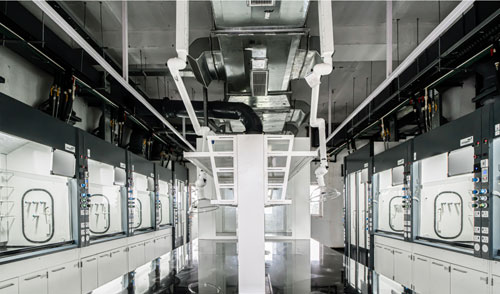
This service involves the synthesis of NCEs, mostly on small scale, often with no literature under strict confidentiality agreement. Executed in the FTE model, in which a team of chemists operate exclusively as per the direction of the client, the delivery turn-around is best achieved with abundant access to automated purification systems and a state-of-the-art analytical infrastructure.
In this model, the client gets a periodical access to the progress made and interacts with the team through regular web meetings.
At the end of achieving the milestone, DSK submits complete experimental procedures which can be directly used in patents/publications. Finally, at the conclusion of the program, a comprehensive project report is submitted to the client.
In this service, DSK usually contributes to improving the synthesis, providing alternate routes thereby assisting in expediting the delivery of the target compounds.
Library Synthesis
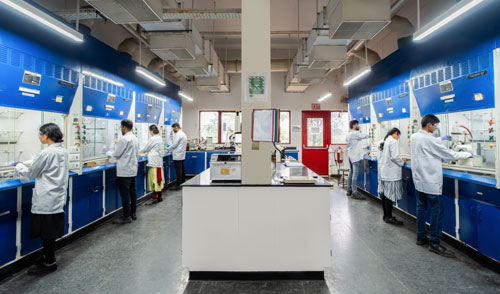
The team has the experience of working in different types of libraries, such as Fragment based Libraries, Nature Inspired Libraries and Target Specific Libraries. For best productivity, a Mass based Preparative HPLC purification system with an autosampler available at DSK can purify the compounds in a faster pace.
In a typical library synthesis project involving the production of large number of compounds, about 10% of randomly picked compounds are characterized. However, all compounds can be characterized for focussed libraries involving a fewer number of compounds.
Yet another experience of DSK is the “Direct to Biology” approach wherein the library of compounds is made directly in 96 well plates so that the invitro studies are done without involving the preliminary work of preparing the plates. In this case, the synthesized compounds are not purified but the influence of the byproducts on the invitro assay is studied prior to the actual experiment.
Process Development
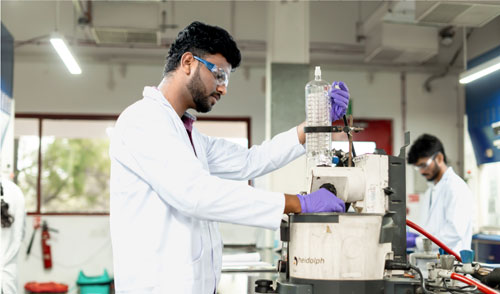
Our highly experienced team offers this service, predominantly in the FTE model for improving the process of a target compound. The sequence in this service will often start with route scouting in which the DSK team will propose maximum number of synthetic routes for a given molecule.
Subsequently, for the prioritised schemes, the feasibility studies followed by process optimization will be systematically undertaken. The best process obtained is usually subjected to a scale-up exercise to make the compound in 1 to 10 kg scale thereby providing the proof of concept.
After the successful completion of a project, the service usually culminates in “technology transfer” which describes the findings in complete details.
DSK can undertake such development work for all types of industries. The client has the flexibility to pick any one or all services such as R&D, Process Development, Scale-up and the Manufacturing.
During the past decade, DSK had established an excellent track record in this service by having worked with a few large companies on a long-term relationship model.
Manufacturing
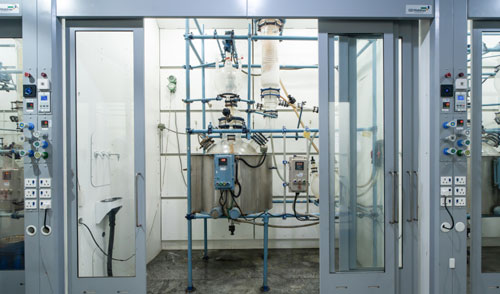
The manufacturing team has completed over 150 projects with 100% track record to produce compounds in 1 Kg to 1000 Kgs scale. The modern facility houses each reactor in a separate fume-room without compromising on the safety and health of the chemists. The raw materials sourced for the manufacturing process are subjected to appropriate analytical qualification and then taken for the user test before employing them in the production work.
A special expertise of the manufacturing team is the ability to distil the products/intermediates at high vacuum (0.01 mm Hg) and at temperatures up to 220 °C using a specially designed distillation facility.
The DSK’s manufacturing facility is ideally suited for generating compounds for early-stage non-GMP toxicology batches.
A special expertise of DSK’s team is their ability to perform back integration exercise wherein the key starting materials (KSM) are further broken down into basic starting materials thereby avoiding the sourcing of expensive KSMs.
Impurities & Standards
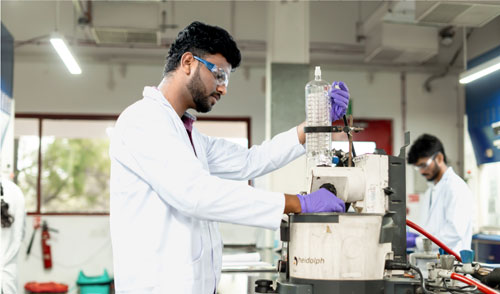
As these compounds do not have adequate literature most of the times, the chemists need to be original in designing new synthetic methods. Tackling the challenge, DSK’s chemistry team has been instrumental in proposing multiple synthetic approaches for every target compound of this class.
In a typical case, DSK has been highly successful in synthesizing and delivering over 90% of the target compounds of this category in an ongoing FTE model involving a team of chemists for over half a dozen years.
Special Capabilities
Carbohydrates

The synthesis of advanced building blocks of carbohydrates has been an area of special expertise that DSK has established over the decade. A team of experienced carbohydrate chemists have completed manufacturing over 300 compounds of quantities ranging from 10 g to tens of Kilos by employing synthetic processes comprising of 5 to 18 steps.
DSK has a record of 100% delivery in these sugar compounds, where monosaccharides and disaccharides building blocks are synthesized using basic carbohydrates such as Glucose, Galactose, Mannose, Glucosamine, Galactosamine, Rhamnose, Fucose etc. Most of the chemistry revolves around glycosidation, selective protection/deprotection and such functional group transformations exclusive to carbohydrates. Arguably, synthesis of carbohydrates has been one of the differentiating capabilities of DSK.
Peptides
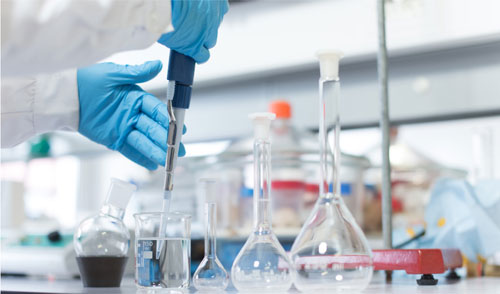
DSK is specialized in synthesizing custom research-grade peptides along with additional expertise in process development and manufacturing.
The following is the comprehensive list of DSK’S capabilities in peptide synthesis.
- Linear peptides: Up to 50 residues, up to g scale, purity ranges from >85%, >90% and >95%
- Disulfide rich peptides (Linear and Cyclic)
- Modified peptides with unnatural amino acids
- Library of 50 compounds (20-50 mg, >90%)
- Branched Chain peptides
- Cyclic peptides: Amides, Lactams & Disulfide bridge
- N-Terminal and C-Terminal modification
- Phosphorylated peptides
- Well-versed in synthesizing peptides using CTC, Wang, Rink amide resins
- PEG, Fluorescein, Biotin labeled peptides
- Library of 50 compounds (20-50 mg, >90%)
Polymer Chemistry
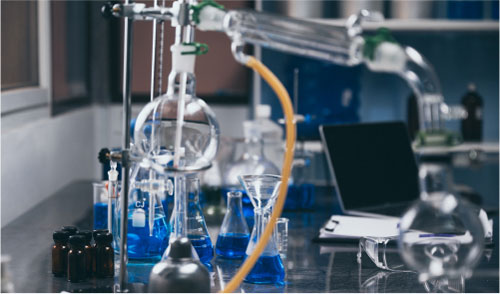
At DSK, we specialize in cutting-edge polymerization techniques to meet material science and other industrial needs. Our expertise spans across diverse advanced polymerization methods such as,
- Free radical polymerization
- Controlled radical polymerization
- RAFT (Reversible Addition Fragmentation Chain Transfer) Polymerization
- ATRP (Atom Transfer Radical Polymerization)
- NMP (Nitroxide-Mediated Polymerization)
- Step-Growth Polymerization
- Polycondensation
- Polyaddition
- Ring-opening polymerization
- Polymer Post-Functionalization
- Polymer Dispersion
Our team has extensive experience with advanced polymerization techniques, and we provide tailored solutions to meet specific needs and applications. We ensure high standards in all our polymerization processes, delivering polymers with exceptional performance and reliability.
Our diverse polymerization methods enable us to finely control polymer properties, including:
- Molecular Weight: Achieve the exact molecular weight needed for the application
- Molecular Weight Distribution: Tailor the distribution to ensure uniformity or create specific profiles for unique performance characteristics.
- Polymer Architecture: Design complex polymer architectures such as block copolymers, star polymers a grafted structure to meet specialized needs.
- Functionalization: Incorporate specific functional groups into the polymer to enhance or impart desired properties.
Leveraging advanced polymerization techniques, we have expertise to design and synthesis a wide variety of polymers, including Poly (Meth)acrylate, Poly (Meth)acrylamide, polystyrene derivatives, polyesters, polyamide, polyimide, polycarbonate, polyurethane, polyurea etc.